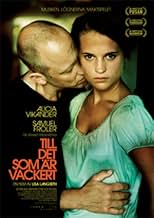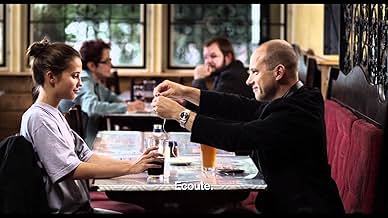With her troubled past, Katarina's life seems to be already set in stone until she discovers music. But the path she has to follow proves a treacherous one filled with lies, betrayal and a d... Read allWith her troubled past, Katarina's life seems to be already set in stone until she discovers music. But the path she has to follow proves a treacherous one filled with lies, betrayal and a dangerous liaison with the married conductor Adam.With her troubled past, Katarina's life seems to be already set in stone until she discovers music. But the path she has to follow proves a treacherous one filled with lies, betrayal and a dangerous liaison with the married conductor Adam.
- Awards
- 8 wins & 2 nominations total
Helén Söderqvist Henriksson
- Marissa
- (as Helén Söderqvist)
- …
- Director
- Writer
- All cast & crew
- Production, box office & more at IMDbPro
Storyline
Did you know
- TriviaAlicia Vikanders first major role which attracted considerable attention within the film industry.
- GoofsNear the end of the movie, Katarina goes to the library and asks for "Rachmaninoff's piano concerto, with Richter." She finds a seat and plays the CD. The audio is not Rachmaninoff though, but Mozart's Clarinet Concerto in A major (K. 622).
- SoundtracksMEDITATION UR THAÏS
Kompositör /Composed by Jules Massenet (1894)
Violinsolist: Christer Thorvaldsson
Göteborgs Symfoniorkester (as Göteborgs Symfoniker)
Dirigent: Neeme Järvi
Featured review
PURE ('Till det som är vackert') is a stunning little film from Sweden written and directed by newcomer Lisa Langseth. It is currently in the 'on demand' section of Eurocinema on television and will likely be released on a USA format DVD soon. The film embraces many subjects - coming of age, the impact of classical music on young minds, affaires de coeur, philosophy, the politics of concert halls, mother daughter relationships scarred by mental illness - and in the end succeeds in dealing with some ethical questions.
Katarina (Alicia Vikander, a brilliant, young, fresh 22 year old Swedish actress) lives in poverty with her boyfriend Mattias (Martin Wallström, a handsome, sensitive blue-eyed actor) in an unkempt apartment where Mattias spends his days watching television while Katarina seeks meaning to her grungy life on the streets as a prostitute. Her family is in disarray - her mother Birgitta (Josephine Bauer) is an alcoholic and a mentally ill wasted person - and Katarina is discontent. By chance she hears some Mozart played on the YouTube and has an epiphany moment. She has been a driven, hurt and hopeful soul, but Hearing Mozart somehow changes that. The music draws her to the Gothenburg Symphony Concert Hall where because of some free tickets she and Mattias hear a performance of the Mozart Requiem as conducted by Adam (Samuel Fröler): the experience bores Mattias but transforms Katarina. The concert hall becomes a magnet for Katarina and as she sneaks into the hall for a rehearsal of the Beethoven 3rd she is mistakenly identified by receptionist Nya (Isabella Bauer) as a potential candidate for job in the hall. Katarina's apparent love for music and her openness gain her the position of Concert Hall receptionist: she has escaped her dreary life and is surrounded by classical music. Gradually Katarina meets and becomes friends with Adam who finds her refreshing and in addition to talking about music he introduces her to great literature and philosophy. The bond grows and Katarina and Adam have an affair, a relationship that is transient because Adam is married. When Adam shares with Katarina that the affair must not go on, Katarina is crushed, and because of the fear Adam holds about her omnipresence in the concert hall, he has her fired. The manner in which this abrupt change in Katarina's transformed new life progresses echoes one of the phrases of Kierkegaard the Adam taught her - "Courage is life's only measure' - and the story takes surprising turns and an even more surprising end.
Much of the success of the film is due to the extraordinary acting by Alicia Vikander, a young talent who seems wise beyond her years as far as intuitive acting skills. The musical score is attributed to Per-Erik Winberg, though the music throughout the film is Beethoven, Mozart, Bach and Massenet. In addition to the story being well written and directed and performed, there is a secondary message for the audience: the introduction to classical music and to cultural concepts can change lives of young people if they gain exposure. It is a challenge we should attempt of provide.
Grady Harp
Katarina (Alicia Vikander, a brilliant, young, fresh 22 year old Swedish actress) lives in poverty with her boyfriend Mattias (Martin Wallström, a handsome, sensitive blue-eyed actor) in an unkempt apartment where Mattias spends his days watching television while Katarina seeks meaning to her grungy life on the streets as a prostitute. Her family is in disarray - her mother Birgitta (Josephine Bauer) is an alcoholic and a mentally ill wasted person - and Katarina is discontent. By chance she hears some Mozart played on the YouTube and has an epiphany moment. She has been a driven, hurt and hopeful soul, but Hearing Mozart somehow changes that. The music draws her to the Gothenburg Symphony Concert Hall where because of some free tickets she and Mattias hear a performance of the Mozart Requiem as conducted by Adam (Samuel Fröler): the experience bores Mattias but transforms Katarina. The concert hall becomes a magnet for Katarina and as she sneaks into the hall for a rehearsal of the Beethoven 3rd she is mistakenly identified by receptionist Nya (Isabella Bauer) as a potential candidate for job in the hall. Katarina's apparent love for music and her openness gain her the position of Concert Hall receptionist: she has escaped her dreary life and is surrounded by classical music. Gradually Katarina meets and becomes friends with Adam who finds her refreshing and in addition to talking about music he introduces her to great literature and philosophy. The bond grows and Katarina and Adam have an affair, a relationship that is transient because Adam is married. When Adam shares with Katarina that the affair must not go on, Katarina is crushed, and because of the fear Adam holds about her omnipresence in the concert hall, he has her fired. The manner in which this abrupt change in Katarina's transformed new life progresses echoes one of the phrases of Kierkegaard the Adam taught her - "Courage is life's only measure' - and the story takes surprising turns and an even more surprising end.
Much of the success of the film is due to the extraordinary acting by Alicia Vikander, a young talent who seems wise beyond her years as far as intuitive acting skills. The musical score is attributed to Per-Erik Winberg, though the music throughout the film is Beethoven, Mozart, Bach and Massenet. In addition to the story being well written and directed and performed, there is a secondary message for the audience: the introduction to classical music and to cultural concepts can change lives of young people if they gain exposure. It is a challenge we should attempt of provide.
Grady Harp
- How long is Pure?Powered by Alexa
Details
Box office
- Budget
- SEK 14,700,000 (estimated)
- Gross worldwide
- $84,013
- Runtime1 hour 37 minutes
- Color
- Aspect ratio
- 1.85 : 1
Contribute to this page
Suggest an edit or add missing content



























